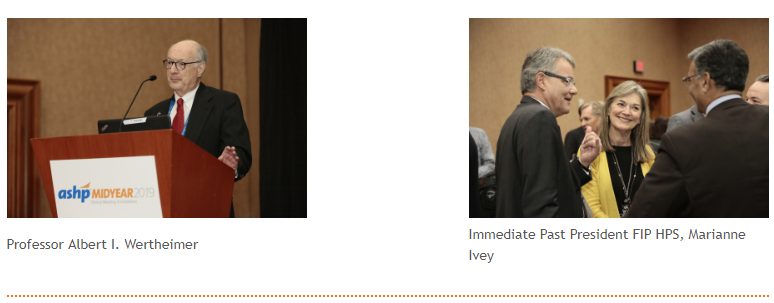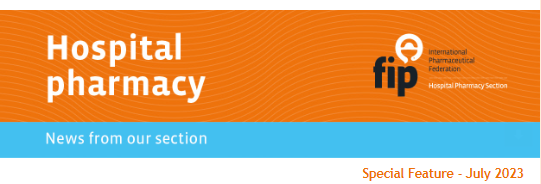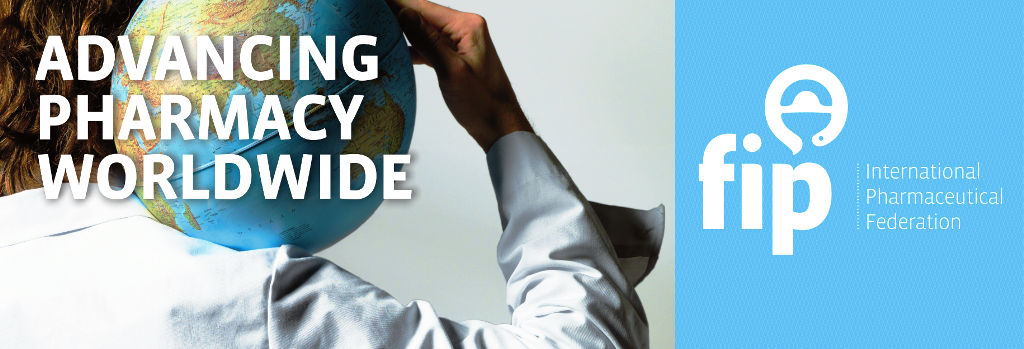

ASHP International Pharmacy Practice Residency Accreditation Celebrates Drive to Improve Care
ASHP’s International Pharmacy Practice Residency Accreditation offers the opportunity for collaboration across countries to elevate pharmacy practice and improve patient care. The ASHP International Accreditation Commission, composed of experts from around the world, oversees a global accreditation process for pharmacy residency programs. Based on a standard applicable to international practice, the process includes a proposal and application, document review, and onsite survey to evaluate an applicant’s pharmacy practice residency program and provide tools to elevate pharmacy practice. Accreditation provides formal, public recognition of the high quality of a residency program.
In July 2019, ASHP Director of Pharmacy Accreditation Lynnae Mahaney and Children’s Cancer Hospital of Egypt 57357 (CCHE) Director of Pharmacy Programs Sherif Kamal conducted a webinar for FIP discussing the process, objectives, and results of accreditation in the context of CCHE’s accreditation journey. During that presentation, Mr. Kamal highlighted the broad scope of services and strategy that CCHE addressed through the comprehensive accreditation process.
Programs in Saudi Arabia, Qatar, UAE, Egypt, and Pakistan have received accreditation, with programs in Spain, China, and several other countries expressing interest or entering the process. In addition to accrediting pharmacy residency programs, ASHP also administers international accreditation for hospital pharmacy services. There is more information about both accreditation programs at ashp.org/global.
![]()
ASHP Midyear Clinical Meeting
The American Society of Health-System Pharmacists (ASHP) Midyear Clinical Meeting is the largest gathering of pharmacists in the world. With its focus on improving patient care, the meeting is attended by more than 20,000 pharmacy professionals from 86 countries. Members of the Hospital Pharmacy Section Executive Committee present at the Meeting took an opportunity to meet in person, discuss the latest developments in the practice of pharmacy, and share the wonderful comradery that members of the FIP enjoy whenever they have a chance to connect anywhere in the world.
For four decades, the ASHP Midyear Clinical Meeting has provided health-system pharmacy practitioners with a venue for updating their knowledge, networking with colleagues, enhancing their skills, and learning about the latest products and technologies. Additionally, the Midyear Clinical Meeting recognizes individuals for their excellence in contributing to the profession of pharmacy through formal awards.Specifically, the ASHP Board of Directors’ Donald E. Francke Medal honors pharmacists who have made significant international contributions to advance pharmacy practice. The medal honor was conferred this past year at the 2019 Midyear Clinical Meeting in Las Vegas, NV to Albert I. Wertheimer, B.S.Pharm., Ph.D., M.B.A. Professor, Nova Southeastern University, College of Pharmacy Fort Lauderdale, FL; and Visiting Professor, Touro College of Pharmacy New York, NY. Much of Dr. Wertheimer’s professional interest has been in international pharmacy. He served for four terms as President of the International Pharmaceutical Federation (FIP) Academic Section, two terms as a FIP Vice President and Council member, and two terms as Chair of the FIP Social and Administrative Section. He has also served on numerous FIP working groups, task forces, and committees. Congratulations to Dr. Wertheimer on this very deserved recognition!

IMSN’S Global Targeted Medication Safety Best Practices
By Nistha Shah, PharmD, ISMP International Medication Safety Management Fellow
The International Medication Safety Network (IMSN) is an international network of safe medication practice centers established in 2006 with the aim of improving medication safety.
Currently, IMSN has over 25 member countries from all continents except Antarctica. Besides safe practice centers, members include government regulators and pharmacovigilance centers.
In June 2019, IMSN published their first set of Global Targeted Medication Safety Best Practices to inspire and mobilize international adoption of consensus-based best practices for specific medication issues that continue to lead to harmful and deadly medication errors. Each global targeted medication safety best practice includes the background, rationale, goal and best practice description.
Global Targeted Medication Safety Best Practice 1: Remove potassium concentrate injection from drug storage areas on all inpatient nursing units/wards.
Global Targeted Medication Safety Best Practice 2: Prepare and dispense vinca alkaloids in a minibag, never in a syringe.
Global Targeted Medication Safety Best Practice 3: Prevent inadvertent daily dosing of oral methotrexate for non-oncologic conditions.
Click here for more information
![]()
Board of Pharmacy Specialties Provides Recognition of Patient Care Skills
The Board of Pharmacy Specialties was established in 1976 as an autonomous division of the American Pharmacists Association. Today, BPS operates across the pharmacy profession in 13 recognized specialty areas using peer-developed, psychometrically-validated certification examinations to confirm the specialized knowledge and skills of pharmacists. Over the last eight years BPS has experienced growth in the number of active board certifications issued from 15,862 to 46,393. While BPS offers U.S.-based board certification examinations, its relevance to pharmacy practice and applicability to improve patient care has grown globally. There are 4,972 international board-certified pharmacists, with at least one in more than 40 countries, representing nearly 10% of all BPS certifications.
The growth in the number of specialty areas and certifications is in response to the evolution of pharmacy practice from product-centered to patient-centered care in a variety of settings, including aged-care and long-term care facilities, community pharmacies, hospitals and health-systems, physician offices and clinics. Board certification is also tied to increased opportunities for pharmacist specialists and the need for practice advancement around the globe. Trends in the education and training of pharmacists are shifting to prepare the profession to address complex medication-related challenges within patient-centered, interprofessional, health care delivery models. Board certification is developing as an international standard that validates the specialized knowledge and skills of pharmacist prepared to contribute to advanced practice and specialization. The BPS examinations are offered twice a year in April/May and September/October at more than 400 test centers in the U.S. and abroad. International candidates, similar to those in U.S., need an active license or registration to practice pharmacy in a local jurisdiction plus two to four years of practice experience in areas defined by the applicable specialty content outline. Visit www.bpsweb.org or contact us for more information.
![]()
Webinars on demand
FIP members have access to all previously recorded webinars from the Hospital Pharmacy Section as well as other sections and SIGs! Please login and visit fip.org/events or navigate from the FIP homepage > Pharmacy data > Webinars/Videos. All webinars have been recently reviewed to ensure the latest evidence is available to our members.

![]()

11 Mar 2020 at 16:00 CET, and
12 Mar 2020 at 09:00 CET
The contribution of pharmacists in non-communicable diseases:
Cancer
Register
![]()
WHoPReC news – Clostridioides difficile infection intervention in South Africa
Clostridioides difficile infection (CDI) is a global health threat and in South Africa the infection is associated with a high risk of mortality. Pharmacist researchers from the University of the Western Cape and the University of Wisconsin-Madison are collaborating on health systems strengthening research for CDI, along with local public district level hospitals in South Africa. The results of their CDI epidemiology and study were previously published in BMJ Global Health and results from their qualitative facilitators and barriers study were previously published in Antimicrobial Resistance and Infection Control. The baseline results and implications are also included in the FIP Hospital Pharmacy Section Webinar titled Clostridium difficile: considerations in a resource-limited setting.
In response to the results, the team designed and implemented a CDI intervention including a CDI checklist and education component. The intervention, implementation process, adaptations, and results were analyzed with an Implementation Science framework, the Consolidated Framework for Implementation Research (CFIR). From the analysis, factors that influenced acceptance and uptake included strong managerial leadership, peer intervention champions, champions in influential leadership positions, and consistent tertiary hospital and external academic affiliations. Further research is needed to explore implementation strategies and readiness for adoption and in resource-limited settings without strong academic affiliation. The findings were presented in December 2019 as a competitive oral presentation at the 12th Annual Conference on the Science of Dissemination and Implementation in Health, co-hosted by the US National Institutes of Health (NIH) and AcademyHealth.
For more information about this work, please contact Laurel Legenza.

![]()

















